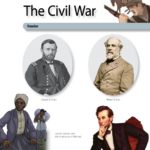Use this lesson alongside The Impeachment of Andrew Johnson Decision Point to introduce students to the concept of impeachment and how it has been used throughout U.S. history.
C-SPAN’s Impeachment Site
This site contains resources to help you teach about the historical and constitutional background of Congress’ impeachment power. You will find coverage and featured clips of the second impeachment and Senate trial of President Donald Trump; lessons on Congress’ role and history of impeachment; and Bell Ringers on the impeachment of Presidents Bill Clinton and
African American History Month Resources
African American History Month evolved from the birthdays of Abraham Lincoln and Frederick Douglass in the second week of February. Historian and author Dr. Carter G. Woodson framed the concept that became the first Negro History Week in February 1926. It developed into a monthlong commemoration of the struggles and triumphs of the African American community. On this page, learn the stories of Autherine Lucy Foster, the first African American student to attempt to integrate the University of Alabama; Frank M. Johnson, Jr., the federal judge who ruled in the Rosa Parks case; and Linda Brown, the 9-year-old who became the face of children caught in the crossfire of the fight for social change. The Pathways to the Bench video series features profiles of African American federal judges who offer perspectives on their experiences during the Civil Rights era.
Congressional Power of Impeachment
In the Constitution, the Congress is given the sole power of impeachment and removing the President and all civil officers from office. This power of Legislative Branch provides a significant check over the Executive and Judicial Branches. This lesson provides explanations of the Constitutional basis of the power, the process for removing officials and the history of impeachments and removing these officials from office. It also provides discussions on the standards of impeachments and how those are interpreted by Congress.
The Rule of Law in Your Life
Rule of law is a principle under which all persons, institutions, and entities are accountable to laws that are: publicly promulgated, equally enforced, independently adjudicated, and consistent with international human rights principles. The Administrative Office of the U.S. Courts has created this resource to help your students understand rule of law with an overview of the topic; opening discussion questions; relevant landmark case summaries; and discussion questions to check for understanding. In a Court Shorts video, nine federal judges explain how fair and consistent adherence to the law protects our rights and well-being in everyday situations.
Cold War Document Based Question
Utilizing primary source documents from the archives of Presidents Truman, Eisenhower, Kennedy, Nixon, and Reagan, this piece of curriculum is modeled after the Advanced Placement Document Based Questions. This question invites students to explore U.S. Cold War foreign policy through the lens the office of the presidency, and to develop crucial critical thinking and writing skills.
The Civil War (CKHG Unit)

This unit explores the political, historical and cultural causes and consequences before, during and after the Civil War, one of our nation’s greatest crises. Across 24 lessons, students engage with the material through primary sources and consider the influence of abolitionists and other intellectual as well as military and political figures.
This unit includes 24 lessons that are about 45 minutes each.
Freedom of Speech: Finding the Limits
As part of the Bill of Rights, freedom of speech is guaranteed by the Constitution, but it is not defined by it. That task is left up to the people through a representative government that makes the laws and a judicial system that interprets and applies the laws to resolve disputes. In this lesson, based on the Annenberg Classroom video “A Conversation on the Constitution: Freedom of Speech,” students gain insight into the many challenges involved in defining and protecting free speech. They also learn about principles that come from Supreme Court decisions and case law that are applied to define the limits for us today.
The First Amendment and Teens
What does the First Amendment mean in the lives of teens? Over the years, the Supreme Court has struggled with First Amendment issues to determine what constitutes protected speech and, in particular, the speech of students. These activities, which engage all learning styles, apply Supreme Court precedents to relatable, teen scenarios. The modified trial simulations have been well tested in federal courtrooms. The resources are ready for immediate use in courtrooms and classrooms.